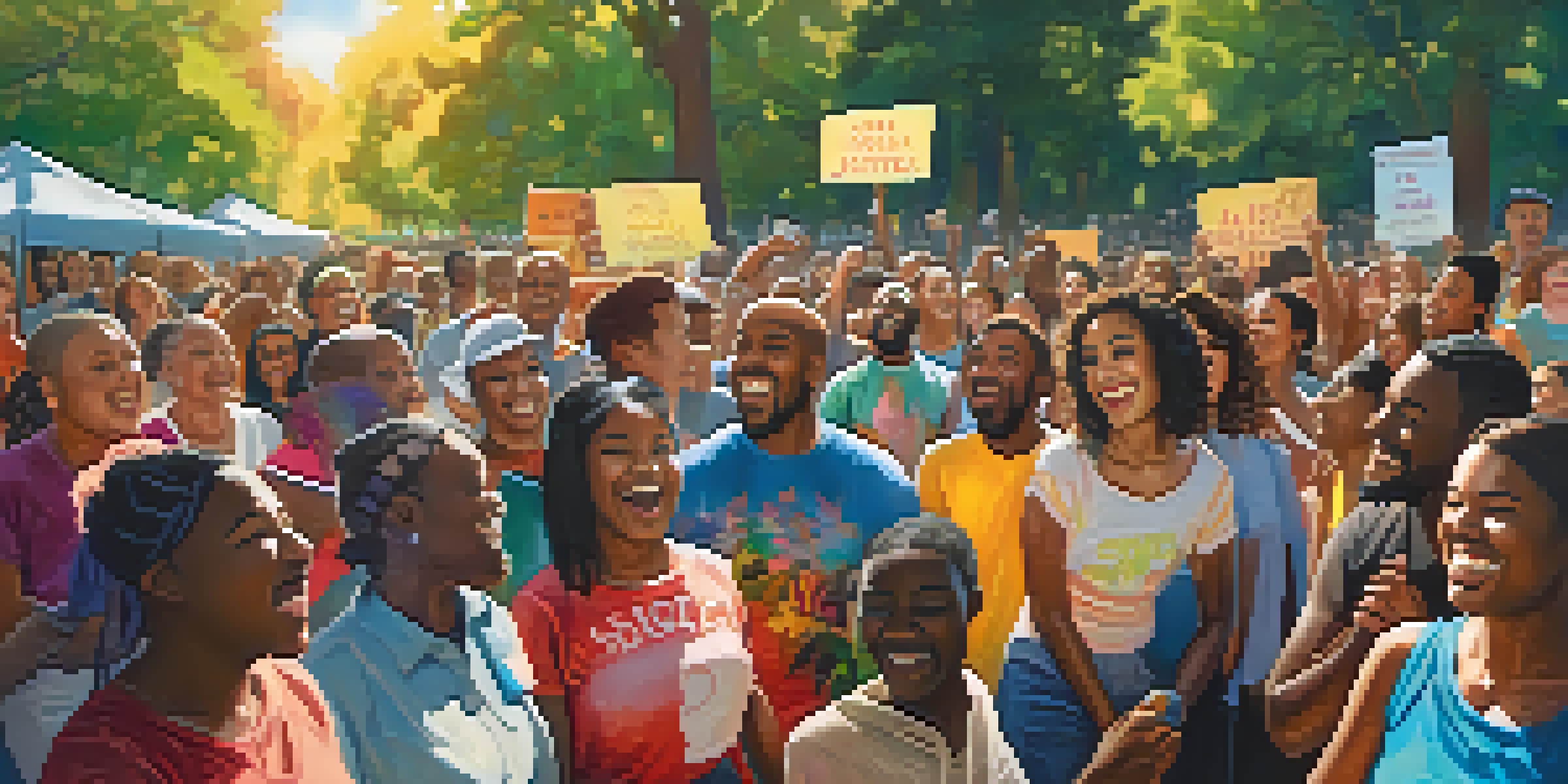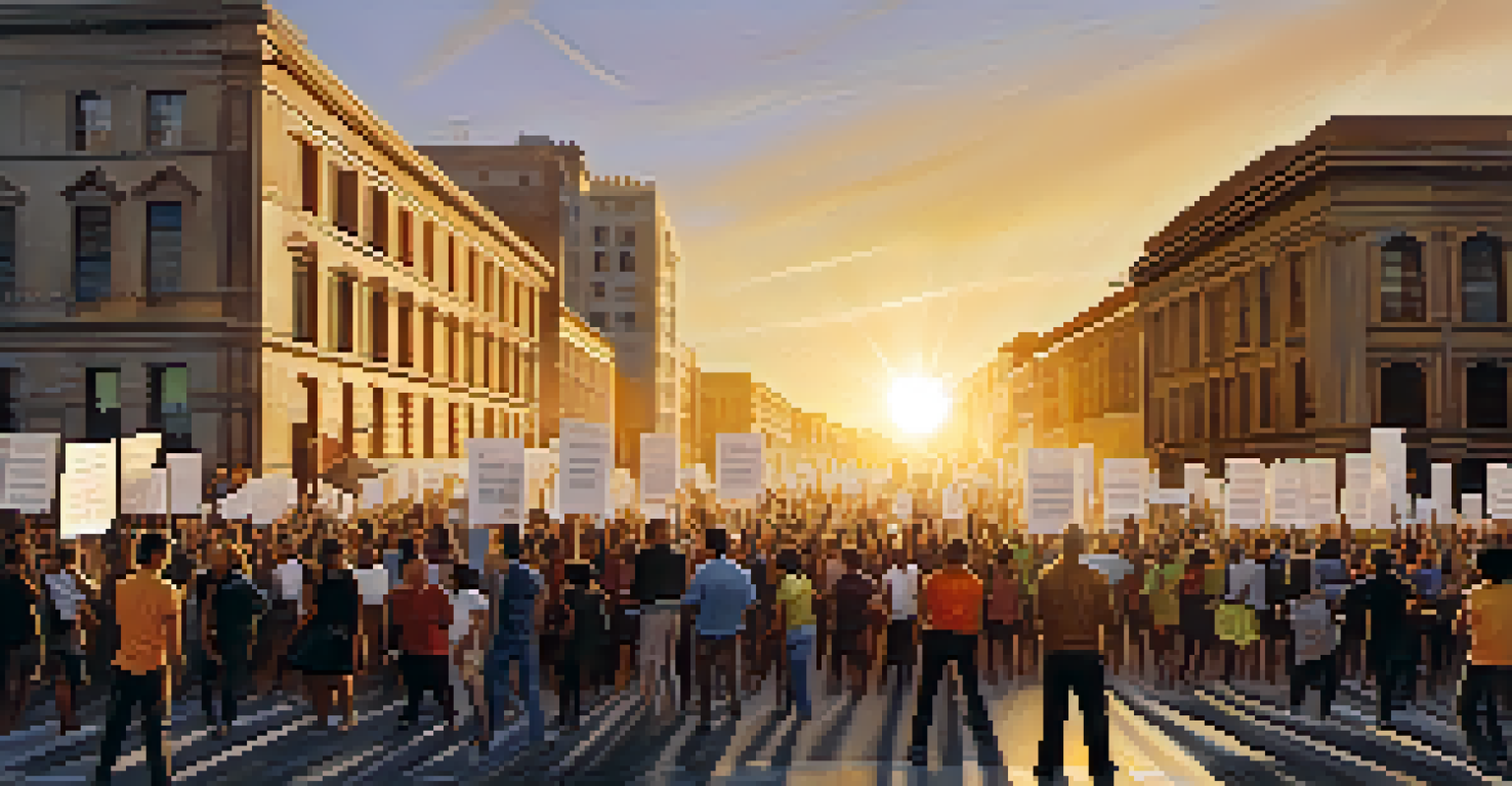The Role of Music in Social Movements and Cultural Change

Understanding Music's Impact on Society
Music is more than just a form of entertainment; it serves as a powerful tool for societal influence. It captures emotions, tells stories, and often reflects the struggles and aspirations of people. Throughout history, music has played a pivotal role in shaping cultural narratives, making it an essential component of social movements.
Music can change the world because it can change people.
Consider the Civil Rights Movement in the United States. Songs like 'We Shall Overcome' became anthems that united individuals in their fight for equality. Music not only provided comfort and hope but also mobilized communities to take action against injustice.
In essence, music resonates with our collective experiences, making it an ideal medium for expressing dissent and rallying support. Its ability to transcend barriers of language and culture underscores its significance in advocating for change.
Historical Examples of Music in Movements
History is replete with examples of music driving social change. From the anti-war protests of the 1960s to the feminist movements of the 1970s, songs have served as powerful weapons in the fight for justice. Artists like Bob Dylan and Joan Baez used their music to voice dissent, challenge the status quo, and inspire others to join the cause.

Moreover, movements across the globe, such as South Africa's struggle against apartheid, relied heavily on music to unite people. The song 'Nkosi Sikelel' iAfrika' became a symbol of resistance, bringing together diverse groups in pursuit of a common goal.
Music Drives Social Change
Throughout history, music has played a crucial role in uniting people and advocating for social movements.
These historical instances illustrate how music can encapsulate the spirit of a movement, creating a shared identity among those involved. The melodies, lyrics, and rhythms not only entertain but also educate and empower.
The Role of Lyrics in Advocacy
Lyrics often serve as the heartbeat of a song, especially in the context of social movements. They can provoke thought, stir emotions, and ignite a sense of urgency. By addressing pressing societal issues directly, songwriters can raise awareness and inspire listeners to take action.
The power of music makes the world go round.
For example, Kendrick Lamar's 'Alright' became a rallying cry during the Black Lives Matter movement. Its powerful lyrics offered hope and resilience while addressing the harsh realities faced by many in marginalized communities. This blend of artistry and activism amplifies the message and reaches a wider audience.
Ultimately, lyrics can distill complex issues into relatable sentiments, making them more accessible to the masses. This accessibility is crucial in mobilizing support and fostering a deeper understanding of the issues at hand.
Music as a Unifying Force
One of the most profound effects of music is its ability to bring people together. At concerts, protests, or community gatherings, music creates a sense of belonging and solidarity. It's a reminder that individuals are not alone in their struggles and aspirations.
During the Women’s March in 2017, for instance, participants sang songs like 'Fight Song' to express unity and determination. These shared musical experiences foster connections among diverse groups, transcending differences in background and belief.
Lyrics Inspire Action
Powerful lyrics can provoke thought and mobilize support by addressing societal issues directly.
This unifying power of music encourages collective action, as participants feel empowered to join forces for a common cause. When people sing together, they create a communal spirit that can amplify their message and impact.
The Evolution of Protest Music
Protest music has evolved significantly over the decades, adapting to the changing landscape of social movements. While folk and rock were dominant genres in earlier movements, today’s protest music spans a wide array of styles, from hip-hop to pop.
Artists like Beyoncé and Childish Gambino have incorporated social commentary into their mainstream music, reaching audiences far beyond traditional activist circles. This evolution reflects a broader cultural shift, where music can be both commercially successful and socially relevant.
As music styles continue to change, the message remains the same: to inspire change and challenge injustice. This adaptability ensures that music remains a vital element of social movements, resonating with new generations of activists.
Digital Age: Music and Social Media
In the digital age, the relationship between music and social movements has become even more intertwined. Social media platforms allow for rapid sharing of songs that resonate with current issues, amplifying their reach and impact. This has transformed how movements organize and gain traction.
For instance, TikTok has emerged as a powerful platform for activism, with users creating viral trends around protest songs. This phenomenon not only spreads awareness but also engages younger audiences who may not have been exposed to these issues otherwise.
Digital Era Amplifies Music's Impact
Social media has transformed how music fuels social movements, making it more accessible and engaging for younger audiences.
The ability to share music widely and instantly means that songs can quickly become anthems for change, mobilizing support across geographical boundaries. The digital landscape is redefining how music fuels social movements, making it more accessible than ever.
The Lasting Legacy of Music in Cultural Change
The impact of music on social movements is profound and lasting. Songs become woven into the fabric of cultural memory, serving as reminders of the struggles and victories of the past. They inspire future generations to continue the fight for justice and equality.
Take 'Imagine' by John Lennon, for example. This song continues to resonate decades after its release, serving as a timeless call for peace and understanding. Its legacy is a testament to the enduring power of music as a catalyst for change.

As we look to the future, it’s clear that music will remain an influential force in cultural change. Its ability to inspire, unite, and mobilize makes it an indispensable part of the ongoing quest for social justice.